| Listing 1 - 10 of 80 | << page >> |
Sort by
|
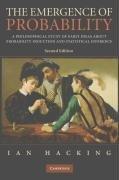
ISBN: 9780521685573 9780521866552 0521866553 0521685575 9780511817557 1107264111 051181755X Year: 2006 Publisher: Cambridge Cambridge University Press
Abstract | Keywords | Export | Availability | Bookmark
 Loading...
Loading...Choose an application
- Reference Manager
- EndNote
- RefWorks (Direct export to RefWorks)
Historical records show that there was no real concept of probability in Europe before the mid-seventeenth century, although the use of dice and other randomizing objects was commonplace. Ian Hacking presents a philosophical critique of early ideas about probability, induction, and statistical inference and the growth of this new family of ideas in the fifteenth, sixteenth, and seventeenth centuries. Hacking invokes a wide intellectual framework involving the growth of science, economics, and the theology of the period. He argues that the transformations that made it possible for probability concepts to emerge have constrained all subsequent development of probability theory and determine the space within which philosophical debate on the subject is still conducted. First published in 1975, this edition includes an introduction that contextualizes his book in light of developing philosophical trends. Ian Hacking is the winner of the Holberg International Memorial Prize 2009.
Philosophy of science --- Probabilities --- Induction (Mathematics) --- Mathematical statistics --- History. --- Arts and Humanities --- Philosophy --- Induction (Logic) --- Mathematics --- Mathematical induction --- Probabilités --- Induction (mathématiques) --- Statistique mathématique --- Histoire --- History
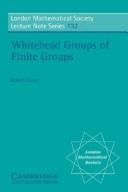
ISBN: 1139884263 1107366267 1107370981 1107361354 1107369320 1299404057 1107363802 0511600658 9781107361355 9780511600654 0521336465 9780521336468 Year: 1988 Publisher: Cambridge Cambridge University Press
Abstract | Keywords | Export | Availability | Bookmark
 Loading...
Loading...Choose an application
- Reference Manager
- EndNote
- RefWorks (Direct export to RefWorks)
This book's aim is to make accessible techniques for studying Whitehead groups of finite groups, as well as a variety of related topics such as induction theory and p-adic logarithms. The author has included a lengthy introduction to set the scene for non-specialists who want an overview of the field, its history and its applications. The rest of the book consists of three parts: general theory, group rings of p-groups and general finite groups. The book will be welcomed by specialists in K- and L-theory and by algebraists in general as a state-of-the art survey of the area.
Whitehead groups. --- Finite groups. --- Induction (Mathematics) --- Mathematical induction --- Induction (Logic) --- Mathematics --- Groups, Finite --- Group theory --- Modules (Algebra) --- Groups, Whitehead --- Abelian groups --- K-theory --- Rings (Algebra)
Book
ISBN: 9780511777110 9781107003637 9781139161381 1139161385 9781139159333 113915933X 0511777116 1283342448 9781283342445 9786613342447 6613342440 1107003636 9781139157568 1139160389 9781139160384 1139155814 9781139155816 1139157566 9781139157568 110722697X Year: 2012 Publisher: Cambridge, UK New York Cambridge University Press
Abstract | Keywords | Export | Availability | Bookmark
 Loading...
Loading...Choose an application
- Reference Manager
- EndNote
- RefWorks (Direct export to RefWorks)
"Induction is a pervasive tool in computer science and mathematics for defining objects and reasoning on them. Coinduction is the dual of induction and as such it brings in quite different tools. Today, it is widely used in computer science, but also in other fields, including artificial intelligence, cognitive science, mathematics, modal logics, philosophy and physics. The best known instance of coinduction is bisimulation, mainly employed to define and prove equalities among potentially infinite objects: processes, streams, non-well-founded sets, etc. This book presents bisimulation and coinduction: the fundamental concepts and techniques and the duality with induction. Each chapter contains exercises and selected solutions, enabling students to connect theory with practice. A special emphasis is placed on bisimulation as a behavioural equivalence for processes. Thus the book serves as an introduction to models for expressing processes (such as process calculi) and to the associated techniques of operational and algebraic analysis"--
Bisimulation. --- Coinduction (Mathematics) --- Modality (Logic) --- Induction (Mathematics) --- Computer science. --- Informatics --- Science --- Mathematical induction --- Induction (Logic) --- Mathematics --- Modal logic --- Logic --- Nonclassical mathematical logic --- Bisimulation --- Mathematical coinduction
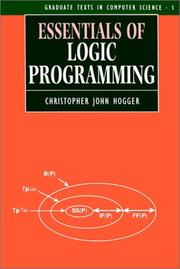
ISBN: 0198538324 9780198538325 Year: 1990 Volume: 1 Publisher: Oxford Clarendon
Abstract | Keywords | Export | Availability | Bookmark
 Loading...
Loading...Choose an application
- Reference Manager
- EndNote
- RefWorks (Direct export to RefWorks)
Logic programming --- Logisch programmeren --- Logische programmering --- Programmation logique --- Programmeren [Logisch ] --- Programming [Logic ] --- 681.3*I23 --- Deduction and theorem proving: answer/reason extraction; reasoning; resolution; metatheory; mathematical induction; logic programming (Artificial intelligence) --- 681.3*I23 Deduction and theorem proving: answer/reason extraction; reasoning; resolution; metatheory; mathematical induction; logic programming (Artificial intelligence) --- Computer programming --- Logic programming.
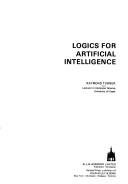
ISBN: 0853127131 0470201231 9780853127130 Year: 1984 Publisher: Chichester Ellis Horwood
Abstract | Keywords | Export | Availability | Bookmark
 Loading...
Loading...Choose an application
- Reference Manager
- EndNote
- RefWorks (Direct export to RefWorks)
681.3*I23 --- Deduction and theorem proving: answer/reason extraction; reasoning; resolution; metatheory; mathematical induction; logic programming (Artificial intelligence) --- 681.3*I23 Deduction and theorem proving: answer/reason extraction; reasoning; resolution; metatheory; mathematical induction; logic programming (Artificial intelligence) --- Artificial intelligence. Robotics. Simulation. Graphics --- Mathematical logic --- Artificial intelligence. --- Logic, Symbolic and mathematical.
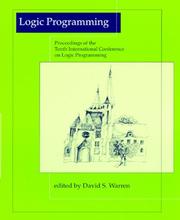
ISSN: 10610464 ISBN: 0262731053 9780262291460 9780262731058 0262291460 Year: 1993 Publisher: Cambridge (Mass.) MIT press
Abstract | Keywords | Export | Availability | Bookmark
 Loading...
Loading...Choose an application
- Reference Manager
- EndNote
- RefWorks (Direct export to RefWorks)
"The Tenth International Conference on Logic Programming, sponsored by the Association for Logic Programming, is a major forum for presentations of research, applications, and implementations in this important area of computer science. Logic programming is one of the most promising steps toward declarative programming and forms the theoretical basis of the programming language Prolog and its various extensions. Logic programming is also fundamental to work in artificial intelligence, where it has been used for nonmonotonic and commonsense reasoning, expert systems implementation, deductive databases, and applications such as computer-aided manufacturing. David S. Warren is Professor of Computer Science at the State University of New York, Stony Brook. Topics covered: Theory and Foundations. Programming Methodologies and Tools. Meta and Higher-order Programming. Parallelism. Concurrency. Deductive Databases. Implementations and Architectures. Applications. Artificial Intelligence. Constraints. Partial Deduction. Bottom-Up Evaluation. Compilation Techniques."
Logic programming --- 681.3*I23 --- Deduction and theorem proving: answer/reason extraction; reasoning; resolution; metatheory; mathematical induction; logic programming (Artificial intelligence) --- 681.3*I23 Deduction and theorem proving: answer/reason extraction; reasoning; resolution; metatheory; mathematical induction; logic programming (Artificial intelligence) --- Programmation logique --- Congresses --- Congrès --- Logic programming - Congresses --- COMPUTER SCIENCE/Programming Languages
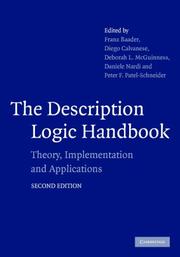
ISBN: 9780521876254 9780511711787 9780521150118 0521876257 0521150116 Year: 2008 Publisher: Cambridge Cambridge University Press
Abstract | Keywords | Export | Availability | Bookmark
 Loading...
Loading...Choose an application
- Reference Manager
- EndNote
- RefWorks (Direct export to RefWorks)
Description Logics are embodied in several knowledge-based systems and are used to develop various real-life applications. The Description Logic Handbook provides a thorough account of the subject, covering all aspects of research in this field, namely theory, implementation, and applications. Its appeal will be broad, ranging from more theoretically-oriented readers, to those with more practically-oriented interests who need a sound and modern understanding of knowledge representation systems based on Description Logics. As well as general revision throughout the book, this new edition presents a new chapter on ontology languages for the semantic web, an area of great importance for the future development of the web. In sum, the book will serve as a unique reference for the subject, and can also be used for self-study or in conjunction with Knowledge Representation and Artificial Intelligence courses.
681.3*F4 --- 681.3*H1 --- 681.3*I23 --- Description logics --- Logics, Description --- Knowledge representation (Information theory) --- Predicate (Logic) --- Mathematical logic and formal languages (Theory of computation) --- Models and principles (Information systems) --- Deduction and theorem proving: answer/reason extraction reasoning resolution metatheory mathematical induction logic programming (Artificial intelligence) --- 681.3*H1 Models and principles (Information systems) --- 681.3*F4 Mathematical logic and formal languages (Theory of computation) --- 681.3*I23 Deduction and theorem proving: answer/reason extraction reasoning resolution metatheory mathematical induction logic programming (Artificial intelligence) --- Logiques de description --- 681.3*I23 Deduction and theorem proving: answer/reason extraction; reasoning; resolution; metatheory; mathematical induction; logic programming (Artificial intelligence) --- Deduction and theorem proving: answer/reason extraction; reasoning; resolution; metatheory; mathematical induction; logic programming (Artificial intelligence) --- Description logics - Handbooks, manuals, etc.
Book
ISBN: 9781107004979 9780511792588 9781139159340 1139159348 1107004977 0511792581 9781139161398 1139161393 1107227232 1283342456 9786613342454 1139160397 1139155822 1139157574 Year: 2011 Publisher: Cambridge Cambridge University Press
Abstract | Keywords | Export | Availability | Bookmark
 Loading...
Loading...Choose an application
- Reference Manager
- EndNote
- RefWorks (Direct export to RefWorks)
"Coinduction is a method for specifying and reasoning about infinite data types and automata with infinite behaviour. In recent years, it has come to play an ever more important role in the theory of computing. It is studied in many disciplines, including process theory and concurrency, modal logic and automata theory. Typically, coinductive proofs demonstrate the equivalence of two objects by constructing a suitable bisimulation relation between them. This collection of surveys is aimed at both researchers and Master's students in computer science and mathematics and deals with various aspects of bisimulation and coinduction, with an emphasis on process theory. Seven chapters cover the following topics: history, algebra and coalgebra, algorithmics, logic, higher-order languages, enhancements of the bisimulation proof method, and probabilities. Exercises are also included to help the reader master new material"--
Bisimulation --- Coinduction (Mathematics) --- Modality (Logic) --- Induction (Mathematics) --- Computer science --- Co-induction (Mathématiques) --- Modalité (Logique) --- Induction (Mathématiques) --- Informatique --- Bisimulation. --- Computer science. --- Informatics --- Science --- Mathematical induction --- Induction (Logic) --- Mathematics --- Modal logic --- Logic --- Nonclassical mathematical logic --- Mathematical coinduction
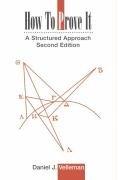
ISBN: 9780521675994 9780521861243 0521675995 0521861241 Year: 2006 Publisher: Cambridge Cambridge University press
Abstract | Keywords | Export | Availability | Bookmark
 Loading...
Loading...Choose an application
- Reference Manager
- EndNote
- RefWorks (Direct export to RefWorks)
Geared to preparing students to make the transition from solving problems to proving theorems, this text teachs them the techniques needed to read and write proofs. The book begins with the basic concepts of logic and set theory, to familiarize students with the language of mathematics and how it is interpreted. These concepts are used as the basis for a step-by-step breakdown of the most important techniques used in constructing proofs. To help students construct their own proofs, this new edition contains over 200 new exercises, selected solutions, and an introduction to Proof Designer software. No background beyond standard high school mathematics is assumed. Previous Edition Hb (1994) 0-521-44116-1 Previous Edition Pb (1994) 0-521-44663-5
Mathematical logic --- Deduction and theorem proving: answer/reason extraction; reasoning; resolution; metatheory; mathematical induction; logic programming (Artificial intelligence) --- 681.3*I23 Deduction and theorem proving: answer/reason extraction; reasoning; resolution; metatheory; mathematical induction; logic programming (Artificial intelligence) --- Logic, Symbolic and mathematical --- Mathematics --- 681.3*I23 --- Math --- Science --- Algebra of logic --- Logic, Universal --- Symbolic and mathematical logic --- Symbolic logic --- Algebra, Abstract --- Metamathematics --- Set theory --- Syllogism --- Logic, symbolic and mathematical --- Logic, Symbolic and mathematical. --- Mathematics. --- Logique symbolique et mathématique --- Mathématiques
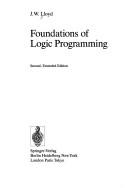
ISBN: 3540181997 3642831915 3642831893 9783540181996 Year: 1987 Publisher: Berlin: Springer,
Abstract | Keywords | Export | Availability | Bookmark
 Loading...
Loading...Choose an application
- Reference Manager
- EndNote
- RefWorks (Direct export to RefWorks)
Programming --- 681.3*F41 --- 681.3*I23 --- Mathematical logic: computability theory; computational logic; lambda calculus; logic programming; mechanical theorem proving; model theory; proof theory;recursive function theory--See also {681.3*F11}; {681.3*I22}; {681.3*I23} --- Deduction and theorem proving: answer/reason extraction; reasoning; resolution; metatheory; mathematical induction; logic programming (Artificial intelligence) --- 681.3*I23 Deduction and theorem proving: answer/reason extraction; reasoning; resolution; metatheory; mathematical induction; logic programming (Artificial intelligence) --- 681.3*F41 Mathematical logic: computability theory; computational logic; lambda calculus; logic programming; mechanical theorem proving; model theory; proof theory;recursive function theory--See also {681.3*F11}; {681.3*I22}; {681.3*I23}
| Listing 1 - 10 of 80 | << page >> |
Sort by
|

 Search
Search Feedback
Feedback About UniCat
About UniCat  Help
Help News
News